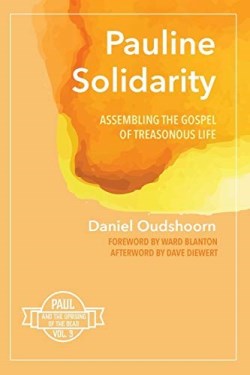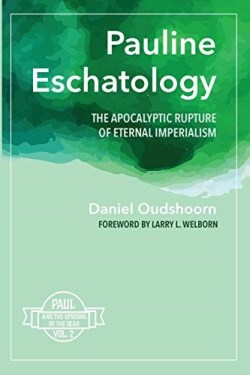Daniel Oudshoorn
Showing all 2 resultsSorted by latest
-
Pauline Solidarity : Assembling The Gospel Of Treasonous Life
$40.00Building on the themes established in the first two volumes of Paul and the Uprising of the Dead, Pauline Solidarity explores: (a) how the Pauline faction transforms relationships within the household unit in the new transnational family of God; (b) how dominant cultural conceptions of honor are rejected in the embrace of shame in the company of the crucified; (c) how vertical practices of patronage are replaced with a horizontal sibling-based political economy of grace; and (d) how the gospel of the Caesars is overcome by the lawlessness of the good news that is being assembled in an uprising of life among the left for dead. Along the way, many of the traditional themes associated with Paulinism (grace, justice, love, loyalty, sin, flesh, death, Jesus, spirit, life) are reexamined and understood as core components of a movement that was spreading among vanquished, colonized, oppressed, dispossessed, and enslaved peoples who were finding new (and treasonous) ways of organizing themselves in order to be life-giving and life-affirming, and in order to counter all the death-dealing structures of Roman imperialism.
Add to cartin stock within 3-5 days of online purchase
-
Pauline Eschatology : The Apocalyptic Rupture Of Eternal Imperialism
$23.00When seeking to understand what Paul and his coworkers were trying to accomplish, it is no longer possible to ignore Graeco-Roman cultural, economic, political, and religious beliefs and practices. Nor can one ignore the ways in which colonized and vanquished peoples adopted, developed, subverted, and resisted these things. Therefore, in order to properly contextualize the Pauline faction, the traditional background material related to Paul and politics must be developed in the following ways: Pauline eschatology must be examined in light of apocalyptic resistance movements; Pauline eschatology must be understood in light of the realized eschatology of Roman imperialism; and the ideo-theology of Rome (its four cornerstones of the household unit, cultural constructs of honor and shame, practices of patronage, and traditional Roman religiosity now all reworked within the rapidly spreading imperial cult[s]) must be explored in detail. This is the task of Pauline Eschatology, the second volume of Paul and the Uprising of the Dead. In it, we will witness how Pauline apocalypticism ruptures the eternal now of empire, and this, then, paves our way for the detailed study of Paulinism that follows in volume 3, Pauline Solidarity.
Add to cartin stock within 3-5 days of online purchase












